必修二unit3知识点学案
人教版高中英语必修二Unit3教案资料
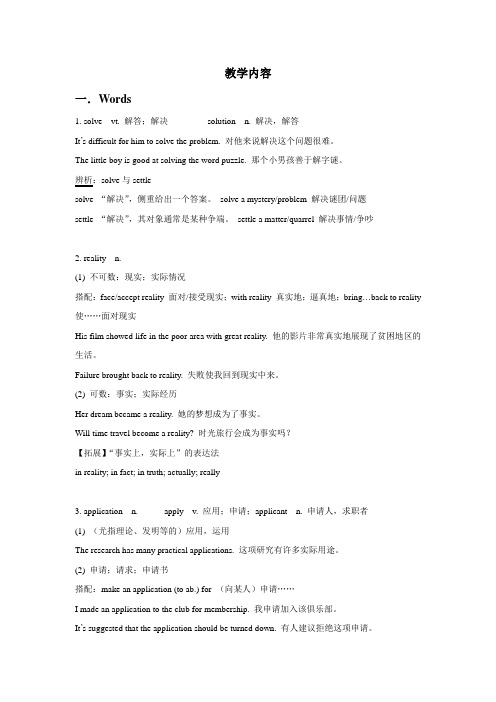
教学内容一.Words1. solve vt. 解答;解决solution n. 解决,解答It’s difficult for him to solve the problem. 对他来说解决这个问题很难。
The little boy is good at solving the word puzzle. 那个小男孩善于解字谜。
辨析:solve与settlesolve “解决”,侧重给出一个答案。
solve a mystery/problem 解决谜团/问题settle “解决”,其对象通常是某种争端。
settle a matter/quarrel 解决事情/争吵2. reality n.(1) 不可数:现实;实际情况搭配:face/accept reality 面对/接受现实;with reality 真实地;逼真地;bring…back to reality 使……面对现实His film showed life in the poor area with great reality. 他的影片非常真实地展现了贫困地区的生活。
Failure brought back to reality. 失败使我回到现实中来。
(2) 可数:事实;实际经历Her dream became a reality. 她的梦想成为了事实。
Will time travel become a reality? 时光旅行会成为事实吗?【拓展】“事实上,实际上”的表达法in reality; in fact; in truth; actually; really3. application n. apply v. 应用;申请;applicant n. 申请人,求职者(1) (尤指理论、发明等的)应用,运用The research has many practical applications. 这项研究有许多实际用途。
(2) 申请;请求;申请书搭配:make an application (to ab.) for (向某人)申请……I made an application to the club for membership. 我申请加入该俱乐部。
2021_2022学年新教材高中英语UNIT3 教学知识细解码学案含解析牛津译林版必修第二册
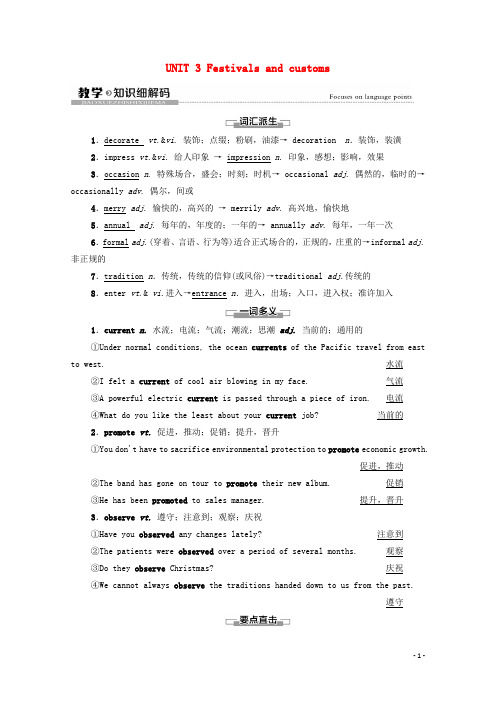
UNIT 3 Festivals and customs1.decorate vt.&vi. 装饰;点缀;粉刷,油漆→ decoration n.装饰,装潢2.impress vt.&vi. 给人印象→ impression n.印象,感想;影响,效果3.occasion n.特殊场合,盛会;时刻;时机→ oc casional adj.偶然的,临时的→ occasionally adv. 偶尔,间或4.merry adj.愉快的,高兴的→ merrily adv. 高兴地,愉快地5.annual adj.每年的,年度的;一年的→ annually adv. 每年,一年一次6.formal adj.(穿着、言语、行为等)适合正式场合的,正规的,庄重的→informal adj.非正规的7.tradition n.传统,传统的信仰(或风俗)→traditional adj.传统的8.enter vt.& vi.进入→entrance n.进入,出场;入口,进入权;准许加入1.current n.水流;电流;气流;潮流;思潮 adj.当前的;通用的①Under normal conditions, the ocean currents of the Pacific travel from east to west. 水流②I felt a current of cool air blowing in my face. 气流③A powerful electric current is passed through a piece of iron. 电流④What do you like the least about your current job? 当前的2.promote vt.促进,推动;促销;提升,晋升①You don't have to sacrifice environmental protection to promote economic growth.促进,推动②The band has gone on tour to promote their new album. 促销③He has been promoted to sales manager. 提升,晋升3.observe vt.遵守;注意到;观察;庆祝①Have you observed any changes lately? 注意到②The patients were observed over a period of several months. 观察③Do they observe Christmas? 庆祝④We cannot always observe the traditions handed down to us from the past.遵守Words and Phrases知识要点1decorate vt.&vi.点缀;装饰,粉刷,油漆(教材P30)The wedding ceremony took place in a brightly decorated hotel room.婚礼在一个装饰明亮的酒店房间举行。
2022届一轮复习人教版高中英语教材透析:必修二 Unit 3 Computers 学案
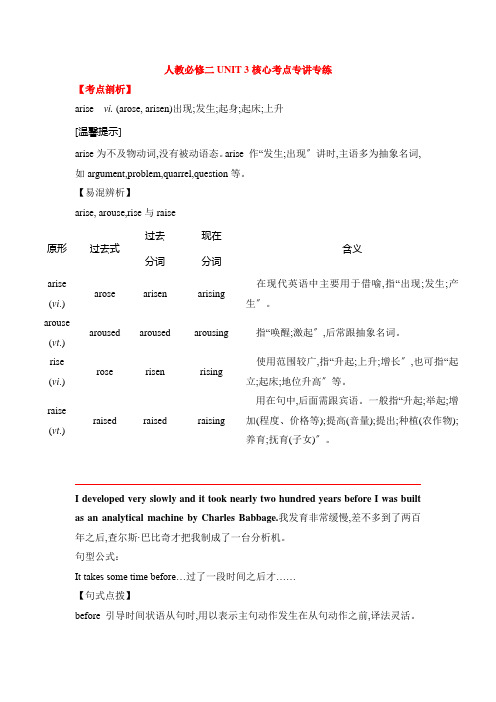
人教必修二UNIT 3核心考点专讲专练【考点剖析】arise vi. (arose, arisen)出现;发生;起身;起床;上升[温馨提示]arise为不及物动词,没有被动语态。
arise 作“发生;出现〞讲时,主语多为抽象名词,如argument,problem,quarrel,question等。
【易混辨析】arise, arouse,rise与raise原形过去式过去分词现在分词含义arise (vi.) arose arisen arising在现代英语中主要用于借喻,指“出现;发生;产生〞。
arouse(vt.)aroused aroused arousing 指“唤醒;激起〞,后常跟抽象名词。
rise (vi.) rose risen rising使用范围较广,指“升起;上升;增长〞,也可指“起立;起床;地位升高〞等。
raise (vt.)raised raised raising用在句中,后面需跟宾语。
一般指“升起;举起;增加(程度、价格等);提高(音量);提出;种植(农作物);养育;抚育(子女)〞。
I developed very slowly and it took nearly two hundred years before I was builtas an analytical machine by Charles Babbage.我发育非常缓慢,差不多到了两百年之后,查尔斯·巴比奇才把我制成了一台分析机。
句型公式:It tak es some time before…过了一段时间之后才……【句式点拨】before 引导时间状语从句时,用以表示主句动作发生在从句动作之前,译法灵活。
(1)强调主句动作发生在从句之前,意为“不等……就……〞。
(2)在“It+be+时间段+before从句〞中,意为“……之后才……〞。
(3)在“It+be+否认形式+long+before从句〞中,意为“……不久就……〞。
高中英语必修二unit3 知识点+练习讲课讲稿

必修2 UNIT 3mon 形容词a.1. )普通的;常见的=general Smith is a very common last name in England. 在英国史密斯是很常见的姓。
2. )一般的,平常的=average3.) 共同的,共有的[(+to)] Common interests bind us together. 共同的利益使我们结合在一起。
4. )公共的,公众的=public We must all work for the common good. 我们大家必须为公共的利益而工作。
commonly adv. 通常地;一般地=generallyhave…in common (with) (和…)有共同之处(a lot/much/plenty/a little/little) \ (something/everything/anything/ nothing)in common 共同;共有in common with 和、、、一样common knowledge 人所共知的事实common sense 常识辨析:common、average、ordinary 、usualcommon:指全体所共有,共同的特征,强调常见与普遍;ordinary :指种类普通,强调平淡、平庸、普遍的意义;average:指达到平均水平,不突出;usual :指经常发生或意料中的事,既可指自然现象,也可指个人的习惯或做事的习惯。
2. provide及物动词vt.1. )提供sth. [(+for)] sb. = offerOn Sundays his landlady provided dinner as well as breakfast. 星期天,他的女房东不但供给早餐,还供给晚餐。
2. )装备,供给[(+with)]= supplySomehow she managed to provide her children with food and clothing. 她总算设法使她的孩子有饭吃,有衣穿。
高中英语 高一年级 必修二Book2 Unit3 语法教学 导学案

高中英语高一年级Book 2 Unit 3语法教学导学案备课组:高一英语主备人:备课时间:上课时间:Array备课组长( 签字):学科组长(签字):审核人(签字):【学习课题】:高中英语Book 2 Unit3语法教学【课时安排】: 课时:第4课时【学习内容】: 本单元语法知识点【学习目标】:1、了解现在完成时的被动语态并学会运用【学习重点】:现在完成被动语态的运用【学习难点】:1.掌握现在完成被动语态的用法【学习关键点】:学会运用所学的知识点,完成高考相关的考查。
【教学用具】:PPT。
【教学过程】:一、课前案(自主学习):(时间:10分钟)1.写出现在完成时态的的基本结构并写出三个相关例句_______________________________________________________________________________________________________________________________________2.判断下面的句子是什么类型的被动语态(1)The cake is made by my mom.(2)The bag is bought by Mike.(3) I was not visited by him yesterday.(4)A computer was not bought last month(5)Many more trees will be planted next year.(6)The classroom will be cleaned by Lilei tomorrow(7)My computer is being used now.3.归纳总结______________________________________________________________________________________________________________________________________三、课后案:I.用括号内单词的正确形式填空。
人教版高中英语必修2 Unit3 语言点课优秀教学设计(一)
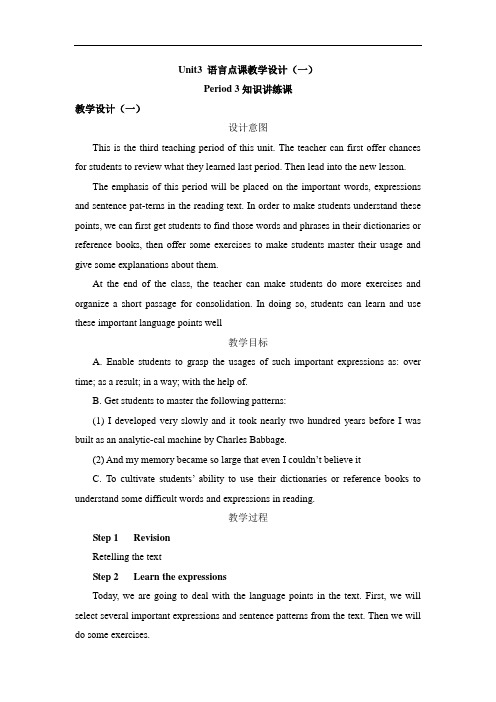
Unit3 语言点课教学设计(一)Period 3知识讲练课教学设计(一)设计意图This is the third teaching period of this unit. The teacher can first offer chances for students to review what they learned last period. Then lead into the new lesson.The emphasis of this period will be placed on the important words, expressions and sentence pat-terns in the reading text. In order to make students understand these points, we can first get students to find those words and phrases in their dictionaries or reference books, then offer some exercises to make students master their usage and give some explanations about them.At the end of the class, the teacher can make students do more exercises and organize a short passage for consolidation. In doing so, students can learn and use these important language points well教学目标A. Enable students to grasp the usages of such important expressions as: over time; as a result; in a way; with the help of.B. Get students to master the following patterns:(1) I developed very slowly and it took nearly two hundred years before I was built as an analytic-cal machine by Charles Babbage.(2) And my memory became so large that even I couldn’t believe itC. To cultivate students’ ability to use their dictionaries or reference books to understand some difficult words and expressions in reading.教学过程Step 1 RevisionRetelling the textStep 2 Learn the expressionsToday, we are going to deal with the language points in the text. First, we will select several important expressions and sentence patterns from the text. Then we will do some exercises.1. Over time I have been changed quite a lot. 经过一段时间,我已经被改变了许多。
必修2 unit3 学案
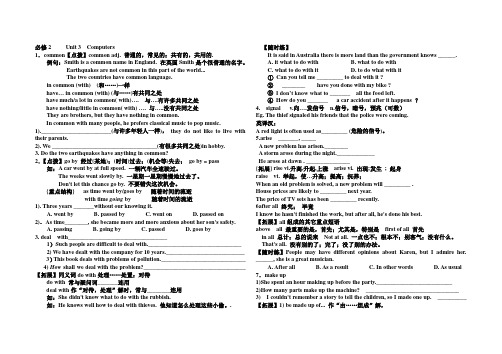
必修2 Unit 3 Computers1.common【点拨】common adj. 普通的,常见的;共有的,共用的.例句:Smith is a common name in England. 在英国Smith是个很普通的名字。
Earthquakes are not common in this part of the world...The two countries have common language.in common (with) (和……)一样have… in common (with) (与……)有共同之处have much/a lot in common( with)…. 与….有许多共同之处have nothing/little in common( with) …. 与…..没有共同之处They are brothers, but they have nothing in common.In common with many people, he prefers classical music to pop music.1).________________________(与许多年轻人一样),they do not like to live with their parents.2). We ____________________________________(有很多共同之处)in hobby.3. Do the two earthquakes have anything in common?2.【点拨】go by 经过(某地);(时间)过去;(机会等)失去;go by = pass 如:A car went by at full speed. 一辆汽车全速驶过。
The weeks went slowly by. 一星期一星期慢慢地过去了。
Don't let this chance go by. 不要错失这次机会。
新外研版必修二:Unit3Onthemove教学·知识细解码学案

新外研版必修⼆:Unit3Onthemove教学·知识细解码学案1.surf v.冲浪→surfing n.冲浪(运动)2.represent v.代表,表⽰→representation n.代表,描绘→representative n.代表adj.典型的,有代表性的3.base v.以……为基础→basis n.基础;根据→basic adj.基础的;根据的→basically ad v.主要地,基本地4.equip v.装备,配备→equipment n.装备,设备,⽤具5.defend v.(在⽐赛中)防守,防卫→defence n.防守;防卫6.die v.死,死亡→dead adj.死的→death n.死,死亡→dying adj.快要死的1.represent v.代表,表⽰;描述,描绘①Mr.Black was chosen to represent the company at the conference.代表②This painting represents the first settlers arriving in America.描述,描绘③This essay represents a considerable improvement on your recent work.表明,表⽰2.goal n.球门;进球得分;⽬标,⽬的①He will keep goal in the football match tomorrow. 球门②The crowd cheered when the home team scored a goal. 进球得分③You should set yourself a goal at the beginning of each school year.⽬标,⽬的Words and Phrases知识要点1represent v.代表,表⽰,描述,描绘;意味着(教材P26)Talk about what you think these things represent in a football game.谈谈你认为这些东西在⾜球⽐赛中代表什么。
- 1、下载文档前请自行甄别文档内容的完整性,平台不提供额外的编辑、内容补充、找答案等附加服务。
- 2、"仅部分预览"的文档,不可在线预览部分如存在完整性等问题,可反馈申请退款(可完整预览的文档不适用该条件!)。
- 3、如文档侵犯您的权益,请联系客服反馈,我们会尽快为您处理(人工客服工作时间:9:00-18:30)。
课题:必修二Unit3 知识点导学案年级:一年级学科:英语班级:姓名:使用时间:编写人:许壮丽审核人:审批人:学习目标:1.掌握重点词汇,短语的用法2.能够在语境中灵活运用它们重点:掌握重点词汇,短语的用法难点: 能够在语境中灵活运用这些重点词汇,短语学习过程:一.重点单词探究1. arise rise raise arouse填一填:(1) The sun _____________ in the east and sets in the west.(2) We should always keep in mind that accidents_____________ from carelessness while driving.(3) After the war the standard of living was __________ rapidly.(4) This book ______________ my interest in politics.2.consider v.___________(1)You’d better consider my suggestion. 你最好考虑我的建议。
(2)I’m considering going abroad some day.我一直考虑有一天出国。
(3)We consider him honest.我们认为他很诚实。
(4)At first they considered me as a doctor.起初他们认为我是医生。
归纳拓展:consider +n./pron./v-ing____________consider sb./ sth+.(as)+形容词/名词_____________3.as 和with的用法区别:As time went by, I was made smaller.随着时间的流逝,我被做得更小了。
As we grow older, we get wiser.随着年龄的增长,我们会变得越来越聪明。
With time going by, they became close friends.随着时间的流逝,他们变成了好朋友。
归纳总结拓展:as是________词,引导时间状语从句;with是_______词,后接名词或代词构成的短语或with构成的复合结构。
go by = pass即境活用:(1)时间慢慢逝去_______________________(2)随着年龄的增长,我们的阅历也益加丰富。
____________________, our experiences become ________________.(3) I couldn’t do my homework with all that noise______.A. going onB. goes onC. went onD. to go on(4) ______ children get older, they become more interested in the things around them.A. WhileB. WhenC. AsD. With二、核心词汇总结:1. in a way_________________all the way一路上,自始至终,完全by the way 顺便说in no way 一点也不,决不in the way 挡道,碍事No way! 别想,没门on one’s way/the way to 在……的路上用way的短语填空:(1)__________________ to school he came across a boy who lost his way.(2) There is a truck____________________ and I can’t get through.(3) _____________, I’m glad you made that mistake, since you can learn from it.(4)__________________, have you seen my umbrella anywhere?2. deal with(1) This is a book dealing with Asian problems. 这是一本论述亚洲问题的书。
(2) How are you going to deal with the money?____________________________(3) I don’t know what to do with the situation. _____________________________归纳总结:deal with(意义)_______________________deal with常与_________连用,而do with则常与________连用。
(what, how)即境活用:(1)—You look so worried. What’s the matter?--I don’t know _______ these boring problems.A. what to deal withB. how to do withC. what can I do withD. how to deal with(2)With the world changing fast, we have something new ______ with all by ourselves every day.A. dealB. dealtC. to dealD. dealing3. so …that ________________Translate the following sentences into Chinese.(把下列句子翻译成汉语)My memory became so large that I couldn’t believe it._____________________________________ The problem is so difficult that nobody can work it out.____________________________________ It was so hot a day that nobody wanted to do anything._____________________________________ I made so many mistakes in the composition that the teacher criticized me.____________________________________________________________归纳总结:sosuch…that…_________________翻译下列句子:It was such a hot day that nobody wanted to do anything.____________________________________It is such fine weather that we all want to go out for a walk.__________________________________ They are such lovely children that we all love them.________________________________________ 归纳总结:such + a/an + ____________ + n. + thatsuch + __________ +不可数名词+ thatsuch + __________ +复数名词+ that The Great Wall is _______ tourist attraction that millions of people pour in(涌来,涌进) every year.A. so a well-knownB. a so well-knownC. such well-known aD. such a well-known4.as a result 与as a result ofIt doesn’t often rain here. As a result, we have to water the vegetable garden.这儿不经常下雨,因此我们不得不给菜园浇水。
He was punished by the teacher as a result of being late for class again._____________________________ 归纳总结:as a result______________ as a result of______________5. In small groups, discuss what they have in common.以小组的形式,讨论他们有哪些共同之处。
(what:所……的)I lived in___________ you call “Ancient Greece”._____________ I have heard has something in common with __________ you have seen.This is _____________________yesterday. 这是我昨天(所)买的___________________________________________他所说的是正确的common _______________________They are twins, but they have little in common.他们是双胞胎,但是几乎没有共同点。
This illness is common among the children.这种病在孩子间很常见。
He wasn’t a hero but a common person.他不是个英雄而是一个普通人。
归纳总结:common sense____________have nothing/little/something/much/a lot in common没有相似之处/几乎没有相似之处/有些相似之处/有很多相似之处即境活用:(1)We share a ________________________.我们有共同的目标。
